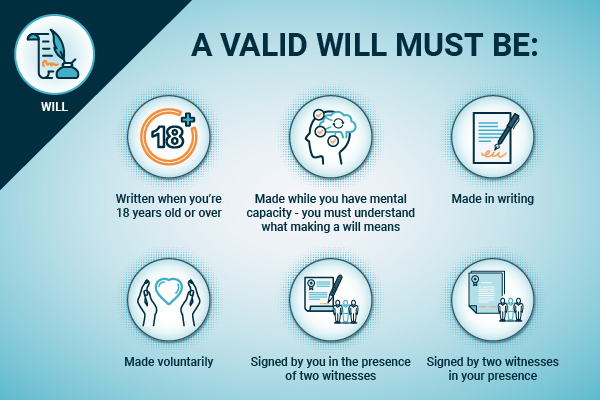No one really likes to think about what they need to do to secure their assets after their passing. But making a will is simpler than you might think.
Here we break down what a will is, what you can include and how to make sure it's legally valid. Your will is one of the most important legal documents you'll sign - make sure it reflects what you want.
What is a will?
A will is a legal document that lays out what happens to your assets after you pass away. This can include things like property, investments, private pensions and items of sentimental value. You can also outline how any dependents will be taken care of, and leave provisions for them. This could be include children, grandchildren or even pets.
Your will is a list of your requests and you can outline limitations on any inheritance. For example, you can put money in a trust until a young family member reaches 25. You can list any charities you would like to donate to, and say how much you want to give.
A will doesn't have to be full of concerning legal jargon. It is simply a list of your wishes to be carried out after your death.
What if I don't write a will?
When someone dies without writing a will, it's called 'intestate'. This means that the person's belongings will be shared out according to UK government law.
If you were married, all of your assets pass to your spouse. If you weren't married, but have children, your estate goes to them. There are no options to change or include anyone else.
Writing a will (and ensuring your loved ones know what it says) will make life easier for your family down the line.
Who writes a will?
You have three choices for making a will when it comes to choosing a legal professional. Solicitors and will writers offer will writing services. They will ensure your will is legally binding.
You can also decide to 'do it yourself' by buying a will template. You simple fill it in, and ensure you have a signature from an independent witness. We don't recommend this unless your will is very simple.
How do I choose between a solicitor and a will writer?
- Solicitors are suitable for anyone writing a will. They are able to deal with estates that are more complex. This might mean you own a business, royalties, property abroad or anything that might be more complicated.
- Professional will writers are experts in will writing, it's their legal profession. They will be able to guide you in getting a clear and legally binding will. However, they are best suited to medium and low complexity wills. They also often cost less than a solicitor.
If you own a home, but the rest of your assets are straightforward, consider a will writer.
If you're still not sure, have a look at our article on the differences between a solicitor and a will writer.
Make sure your will is valid
Ensuring your will is legally valid will stop people contesting it. To contest a will, one argues about how the assets are shared out. Often this sort of legal challenge is carried out by someone who believes they should have been included in the will, or expected they would receive more.
The person contesting has to prove that the will is invalid. This could be down to a missed signature or a more serious allegation of fraud or undue influence.
The most important thing is to make sure it meets the legal requirements. It should be clear that this is a will. And that these are your latest, most- up-to-date, final wishes.
A valid will must be:
- Written when you’re 18 years old or over
- Made while you have mental capacity – you must understand what making a will means
- Made in writing
- Made voluntarily
- Signed by you in the presence of two witnesses
- Signed by two witnesses in your presence

What to include in your will
Whether you sit down with a legal professional or think it all out yourself, consider the following:
Start with your estate
Your estate is everything you own. Your home, your possessions, your money, and your assets. You should have a clear idea of your whole estate. A solicitor or will writer can advise if you've forgotten anything.
Your debts are also part of your estate. When you pass away, these are paid off first. What remains is then divided up amongst inheritors.
Choose who gets what
The people who inherit from your estate are known as your beneficiaries. Be specific where necessary in your will. Don’t leave everything open to interpretation (and open to a challenge).
It’s entirely up to you who gets what – but consider the tax implications. You don’t want your family losing out on much-needed security. This is where will-writing can get a bit tricky, so it’s best to get legal advice even if you intend to write your own will. A solicitor should be able to advise on things like inheritance tax in relation to your will, but you may also want to speak to a financial advisor.
It’s not like in the movies. Your beneficiaries are unlikely to all gather in a solicitor’s office to hear the reading of the will.
Once probate is complete and the will is determined as valid, the executor will notify them about the inheritance due. Your beneficiaries must be notified within three months, but the sooner the better. They can then respond, ask questions, or contest the will if they believe it’s invalid.
Think of the children
If you have kids, think about how your will provides for your children when you’re gone. Your will should nominate a guardian – someone to look after the kids if both parents pass away.
Children can’t receive an inheritance until they’re at least 18 years old or over. You may increase this, commonly to 21 or 25 years old.
In the meantime, your child’s inheritance is placed in a trust overseen by a trustee of your choosing. So, choose wisely and plan for financial arrangements until they come of age. Ensure you've spoken with the person you want to look after your kids, and any trustee you choose for their inheritance. These things can be a shock if no one knows your plans.
Choose a responsible executor and witnesses
Your will must name at least one executor. This is the person who will ‘collect’ your estate and distribute it according to your will. An executor can also be a beneficiary (someone who benefits from your estate).
You may name up to four executors, and it’s best to name at least two. That way, you have a substitution if your first choice is unwilling or unable to act. Choose an executor who is responsible, organised, and fair. There’s a lot of work involved, so many people name their partner or a solicitor.
Choose your two witnesses on a similar basis. Reliable, honest, and financially independent. Witnesses may not benefit from your will (and any request in the will is ignored). If the will is later challenged, it’s the witnesses’ job to attest you made the will ‘of sound mind’ and that the choice was yours.
Usually, all of you must be in the same room when watching each other sign and date the will. However, due to the pandemic, wills may be witnesses through a door or window, or by video-call.
Executors and witnesses must be 18 years old or over and mentally capable.
What not to put in your will
There are a few assets you shouldn’t (or won’t need) to put in your will.
Joint bank accounts and properties
Joint bank accounts and joint tenancy properties will automatically revert to the surviving partner. Your will has no impact on this process.
Business assets
Depending on the business structure, you probably won’t be able to gift assets without the say-so of the surviving business partners.
Life insurance and pensions
Your life insurance and pension pot should already name a beneficiary, so there’s no need to add these to your will.
Specific conditions and wishes
Your will should be actionable instructions and encouragements, but you can’t legally oblige someone to marry in order to inherit.
Your dream funeral procession
You may dream of a boulevard of mourners led by a top-hatted officiant and black-clad pallbearers. But avoid setting out funeral arrangements in your will. Probate can take several months, meaning your funeral service may be over before your wishes are even revealed.
If your funeral wishes are important to you, make sure you share them with a loved one.
Things you don’t own
If it’s not yours, you can’t leave it as a gift. It may sound obvious, but you’d be surprised how many people try!
Storing your will
You don’t need to legally register a will (although there are services offering this) – but you must keep the original copy safe.
You can keep it at home, in a bank, or leave it with your solicitor. You can also use a will storage company or the London Probate Service.
Tell your executor, and anyone else who may need to know, where your will is stored. They’ll need it to apply for a grant of probate.
Changing your will
Making a will is an important step. So, you want to get it right first time.
However, it’s a good idea to update your will using a 'codicil'. This is simply a note attached to the original will with any updated information. For example, you now have a new grandchild and want them to be included.
In some cases, making a new will makes more sense. Whenever you experience a big change in life circumstances, like getting married, buying a house, or having a baby, making a new will is best.
You may also want to make sure someone doesn’t inherit from your estate. If you don’t want someone to inherit, don’t simply leave them out of your will. They could mount a challenge suggesting you forgot to include them. Instead, grant them a token gift that shows you didn’t accidentally leave them out.
Be careful about adding too many codicils, as they can make your instructions unclear and open to a challenge. If you have too many, consider writing a new will from scratch.
Learn more about writing a will.
Article updated August 2023 by Andi Forsythe
